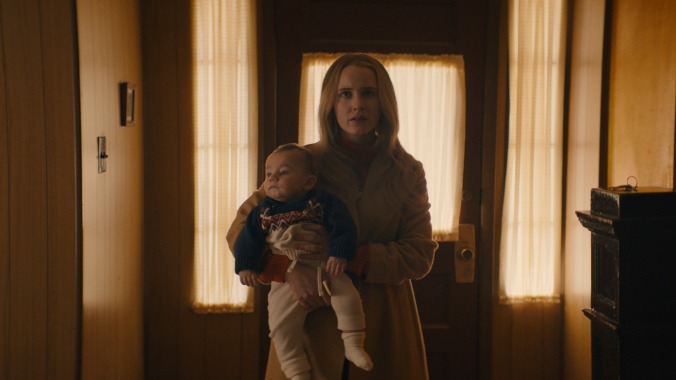There’s a point in many gangster dramas where the wife, whether she be a shining symbol of redemption, a martini-swilling drunk, or an irritating nag, becomes superfluous. The antihero rushes home and grabs an empty duffel bag, throwing in clothes and cash with frenzied abandon before shoving the parcel into her hands. “Don’t ask questions,” he says. “Just go.” Sensing from his tone of voice that he’s really serious this time, she complies, wrapping up her already skimpy character arc as she goes.
I’m Your Woman, the latest from Fast Color director Julia Hart, does contain such a scene early on. It’s important to note when the panicked exit occurs in the ’70s set crime drama, because with her fourth feature, Hart is embarking on a stimulating exercise: telling the story of what happens to the criminal’s spouse once she’s sent away for her own safety. As novel as that sounds, Hart’s isn’t the first movie to reframe the tough-guy crime movie from a woman’s perspective; in fact, the concept has become something of a theme over the past couple of years, producing both great films and ones that are, well, not so great. I’m Your Woman sails right down the middle.
Rachel Brosnahan stars as Jean, the second wife (although she doesn’t know that just yet) of professional thief Eddie (Bill Heck). Jean doesn’t ask a lot of questions, not that Eddie would answer them if she did; she’s aware that he’s a career criminal, but sincerely has no clue where he’s run off to when one of his associates, Cal (Arinzé Kene), barges into their well-appointed suburban home and insists that it’s time to leave. As in, now. Jean’s willful ignorance is then chipped away, safe house by safe house, as this passive and timid woman learns how capable she really is in a series of daring escapes and bold confrontations with the men who want to punish her for her husband’s sins. She does so with the help of Cal’s family, particularly his wife Teri (Marsha Stephanie Blake), who understands Jean’s plight better than anyone.
Solidarity among women is a major theme in I’m Your Woman, in which a weeping Jean is comforted by an elderly stranger at a bus stop and soothed by a motherly neighbor who comes bearing lasagna and wine, not to mention Teri’s diligent work in opening Jean’s eyes to who Eddie really is. (Or was. Jean doesn’t know, so neither do we.) Of course, getting close to Jean is dangerous, given that she’s being hunted by some very violent people. And Hart and co-writer Jordan Horowitz don’t pull any punches (so to speak) when it comes to body count, although Hart doesn’t drench the screen in blood in the style of cinema’s most famous ’70s revivalist, Quentin Tarantino. But while the plot continues to simmer with new locations and revelations, the action never quite reaches a full boil, with the thrilling exception of a chaotic nightclub massacre.
Brosnahan spends a good portion of that scene hiding in a phone booth as terrified partiers run past her screaming, a good example of where the film’s deliberately blinkered storytelling—it’s told from Jean’s limited point of view, but not quite in the first person—works. By this same design, I’m Your Woman’s most compelling moments are quiet, domestic ones; much of Jean’s strength is derived from her fierce devotion to her infant son, making this a slow-burn addition to a canon of mama-lion films that includes John Cassavetes’ Gloria (1980) and—speaking of Tarantino—the Kill Bill movies. Analyzing the acting from a baby is largely projection, but the bond between Brosnahan and the three infants who play her son Harry is tender and believable—more believable, in fact, than her dynamic with the adults in the film. In general, Brosnahan’s performance is of a piece with the rest of the movie, steady but not especially dynamic. And given that the story is so intently focused on her character, she may be a big reason why it feels that way.
Rather than performances or set pieces, what stands out the most about I’m Your Woman is the meticulous period detail. Connoisseurs of wood paneling, patterned wallpaper, AM Gold radio hits, chunky rotary phones in warm autumn colors, paisley, fake fur, and wool wrap coats will need a bib and some wet naps after feasting on the costumes and production design, which are loud where the rest of the film is muted. As always, utilizing such bold aesthetics carries the risk of, to borrow a phrase from fashion, the dress wearing you rather than you wearing the dress. To a certain extent, that happens here. But I’m Your Woman also calls back to the neo-noirs that inspired it in one essential, more ephemeral way: It takes familiar tropes and refreshes them for a new generation. In the ’70s, that meant cynical male antiheros. Now, it’s the women’s turn.


